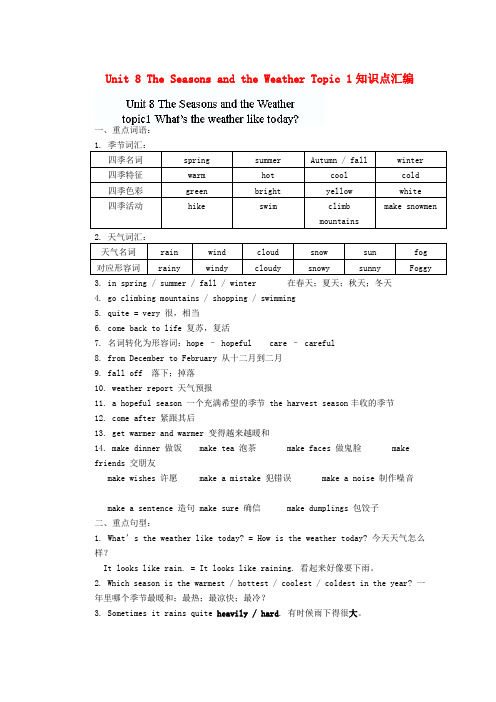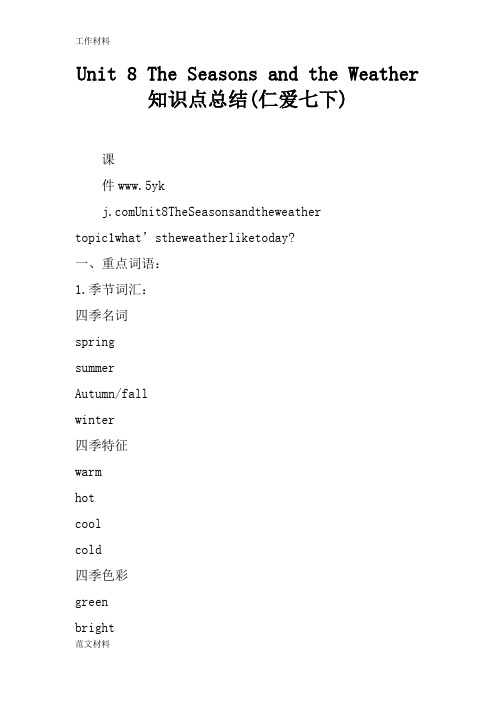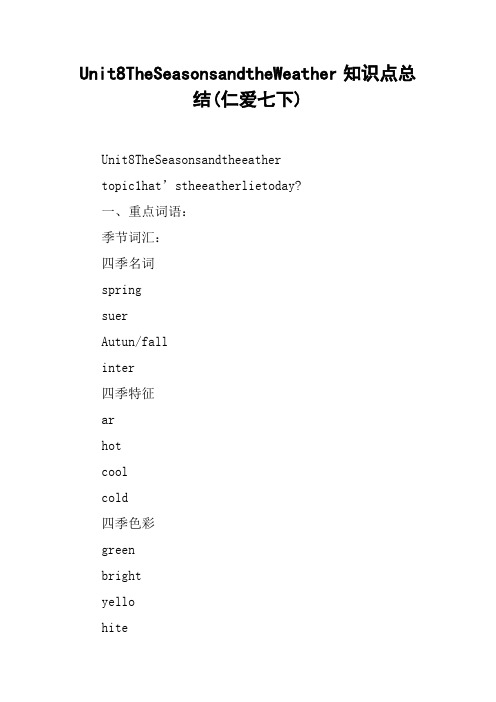七年级英语下册Unit8TheSeasonsandtheWeather词汇精讲精练新版仁爱版2
- 格式:doc
- 大小:48.00 KB
- 文档页数:8

Unit 8 The Seasons and the Weather Topic 1知识点汇编一、重点词语:3. in spring / summer / fall / winter 在春天;夏天;秋天;冬天4. go climbing mountains / shopping / swimming5. quite = very 很,相当6. come back to life 复苏,复活7. 名词转化为形容词:hope – hopeful care – careful8. from December to February 从十二月到二月9. fall off 落下;掉落10. weather report 天气预报11. a hopeful season 一个充满希望的季节 the harvest season丰收的季节12. come after 紧跟其后13. get warmer and warmer 变得越来越暖和14. make dinner 做饭 make tea 泡茶make faces 做鬼脸make friends 交朋友make wishes 许愿make a mistake 犯错误make a noise 制作噪音make a sentence 造句 make sure 确信make dumplings 包饺子二、重点句型:1. What’s the weather like today? = How is the weather today? 今天天气怎么样?It looks like rain. = It looks like raining. 看起来好像要下雨。
2. Which season is the warmest / hottest / coolest / coldest in the year? 一年里哪个季节最暖和;最热;最凉快;最冷?3. Sometimes it rains quite heavily / hard. 有时候雨下得很大。

Unit 8 The Seasons and theWeatherTopic 1 what’s the weather like in summer?Section A1. What's the weather like in spring?春天天气怎么样?"What's the weather like ...?”是用来询问天气状况的句型。
还可以用“How’s the weather...?"来表达。
如:-What's the weather like there in winter? =How'sthe weather there in winter? 那里冬天天气怎么样?-It often snows.常常下雪。
2. It's a good time to climb hills.这是登山的好时节。
句型“It+be+名词/形容词+to do/for doingsth.”意为“这/那是做某事的……”。
如:It is a good season for hiking.这是徒步旅行的好季节。
It is hard to say.这难说。
3. --why? 为什么?--because I learned to swim last year,….因为我去年学了游泳,…(1) Why?的完整句子应为Why do you likesummer best?(2 ) learn to do sth.意为“学会做某事(未做)。
如:Judy is learning to dance.朱迪在学跳舞。
4. When it snows, I can make snowmen.下雪时我可以堆雪人。
Snow v.意为“下雪”。
如:Itsnowedlast night.昨晚下了一场大雪。
snow n. 意为“雪”,不可数名词。
There was a heavy snow Last night. 昨晚下了一场大雪。

Unit 8 The Seasons and the WeatherTopic 1 what’s the weather like in summer?Section A1. What's the weather like in spring?春天天气怎么样?"What's the weather like ...?”是用来询问天气状况的句型||。
还可以用“How’s the weather...?"来表达||。
如:-What's the weather like there in winter? =How's the weather there in winter? 那里冬天天气怎么样?-It often snows.常常下雪||。
2. It's a good time to climb hills.这是登山的好时节||。
句型“It+be+名词/形容词+to do/for doing sth.”意为“这/那是做某事的……”||。
如: It is a good season for hiking.这是徒步旅行的好季节||。
It is hard to say.这难说||。
3. --why? 为什么?--because I learned to swim last year||,….因为我去年学了游泳||,…(1) Why? 的完整句子应为Why do you like summer best?(2 ) learn to do sth.意为“学会做某事(未做)||。
如:Judy is learning to dance.朱迪在学跳舞||。
4. When it snows||,I can make snowmen.下雪时我可以堆雪人||。
Snow v.意为“下雪”||。
如:It snowed last night.昨晚下了一场大雪||。
snow n. 意为“雪”||,不可数名词||。

Unit 8 The Seasons and the Weather 知识点总结(仁爱七下)课件www.5ykUnit8TheSeasonsandtheweathertopic1what’stheweatherliketoday?一、重点词语:1.季节词汇:四季名词springsummerAutumn/fallwinter四季特征warmhotcoolcold四季色彩greenbrightyellowwhite四季活动hikeswim climbmountains makesnowmen 2.天气词汇:天气名词rainwindcloudsnowsunfog对应形容词rainywindycloudysnowysunnyFoggy3.inspring/summer/fall/winter在春天;夏天;秋天;冬天4.goclimbingmountains/shopping/swimming5.quite=very很,相当ebacktolife复苏,复活7.名词转化为形容词:hope–hopefulcare–careful8.fromDecembertoFebruary从十二月到二月9.falloff落下;掉落10.weatherreport天气预报11.ahopefulseason一个充满希望的季节theharvestseason 丰收的季节eafter紧跟其后13.getwarmerandwarmer变得越来越暖和14.makedinner做饭maketea泡茶makefaces做鬼脸makefriends交朋友makewishes许愿makeamistake犯错误makeanoise制作噪音makeasentence造句makesure确信makedumplings包饺子二、重点句型:1.what’stheweatherliketoday?=Howistheweathertoday?今天天气怎么样?Itlookslikerain.=Itlookslikeraining.看起来好像要下雨。
![[K12学习]七年级英语下册Unit8TheSeasonsandtheWeather词汇精讲精练新版仁爱版](https://img.taocdn.com/s1/m/bb8b79164b35eefdc8d3338b.png)
Unit 8 The Seasons and theWeather词汇精讲精练【词汇精讲】1. wear / put onwear是及物动词,可用于穿衣、穿鞋、戴帽子、戴手套、佩戴首饰等,强调状态。
例如:I’m going to wear a pair of sunglasses tomorrow.明天我打算戴一副太阳镜。
She is wearing a hat.她戴着一顶帽子。
【拓展】(1)put on表示穿衣服的动作,其反义词是take off。
例如:He quickly put on his shoes and ran out.他迅速穿上鞋,跑了出去。
(2)have on 和in 都指穿的状态,但have on不用于进行时态;in是介词,可以和表示服装或颜色的名词一起构成介词短语作定语,也可以和be动词连用构成系表结构。
例如:He has a red T-shirt on. = He is in a red T-shirt.他穿一件红色的T恤衫。
The girl in pink is my little sister.穿粉色衣服的那个女孩是我的小妹妹。
2. had betterhad better(常简略为’d better)是一固定词组,had better意为“最好”,用于表示对别人的劝告、建议或表示一种愿望。
其用法有以下几点:(1)had better后面必须跟动词原形,构成had better do sth.句型,意为“最好做某事”。
【注意】这里的had不能用have来替换。
例如:You’d better go to hospital at once.你最好立即去医院看病。
Tom, you’d better go there today.汤姆,你最好今天去那里。
(2)主语不论是第几人称,句子不论是什么时态,都要用had better的形式。
例如:Now you (he; we) had better listen to the teacher.你(他,我们)现在最好听老师讲。

Unit8TheSeasonsandtheWeather知识点总结(仁爱七下)Unit8TheSeasonsandtheeathertopic1hat’stheeatherlietoday?一、重点词语:季节词汇:四季名词springsuerAutun/fallinter四季特征arhotcoolcold四季色彩greenbrightyellohite四季活动hiesiclibountainsaesnoen天气词汇:天气名词rainindcloudsnosunfog对应形容词rainindcloudsnosunnFoggyinspring/suer/fall/inter在春天;夏天;秋天;冬天goclibingountains/shopping/siingquite=very很,相当ebactolife复苏,复活名词转化为形容词:hope–hopefulcare–carefulfroDecebertoFebruary从十二月到二月falloff落下;掉落0.eatherreport天气预报1.ahopefulseason一个充满希望的季节theharvestseason丰收的季节eafter紧跟其后3.getarerandarer变得越来越暖和aedinner做饭aetea泡茶aefaces做鬼脸aefriends交朋友aeishes许愿aeaistae犯错误aeanoise制作噪音aeasentence造句aesure确信aeduplings包饺子二、重点句型:hat’stheeatherlietoday?=Hoistheeathertoday?今天天气怎么样?Itlooslierain.=Itlooslieraining.看起来好像要下雨。
hichseasonisthearest/hottest/coolest/coldestintheye ar?一年里哪个季节最暖和;最热;最凉快;最冷?Soetiesitrainsquiteheavily/hard.有时候雨下得很大。
仁爱英语七年级下册Unit 8 The Seasons and the Weather.知识点讲解Unit 8 The Seasons and the WeatherTopic 1 what’s the weather like in summer? Section A1. What's the weather like in spring?春天天气怎么样?"What's the weather like ...?”是用来询问天气状况的句型。
还可以用“How’s the weather...?"来表达。
如:-What's the weather like there in winter? =How's the weather there in winter? 那里冬天天气怎么样?-It often snows.常常下雪。
2. It's a good time to climb hills.这是登山的好时节。
句型“It+be+名词/形容词+to do/for doing sth.”意为“这/那是做某事的……”。
如:It is a good season for hiking.这是徒步旅行的好季节。
It is hard to say.这难说。
3. --why? 为什么?--because I learned to swim last year,….因为我去年学了游泳,…Guangdong.夏季广东雨量充沛。
但表示“一场大雨”时,之前可以加a。
There was a heavy rain last night.昨晚下了场大雨。
Section B1. How are things going?事情进展得怎么样?用来询问对方处境或事情进展的习惯用语,相当于汉语的“一切还好吗?”;后面可跟介词短语with sb.。
"How are things going?”也可以用“How is everything going?”来表达。
Unit 8 The Seasons and the WeatherTopic1 How is the weather in winter?Section A一:重点词语1. 季节词汇:四季名词spring春summer夏autumn / fall秋winter冬四季特征 warm暖和 hot炎热 cool凉爽 cold寒冷四季活动 fly kites放风筝 go swimming去游泳 climb hills 爬山 make snowmen堆雪人二:重点句型1. What’s the weather like in spring? 春天的天气怎么样?It’s warm. 它是暖和的。
2. How is the weather in fall? 秋天天气怎么样?It’s cool. 它是凉爽的。
3. Which season do you like best? 你最喜欢那个季节?I like winter best.我最喜欢冬天。
4. It’s a good season for flying kites. 它是放风筝的好季节。
It’s a good time to climb hills. 它是爬山的好时节。
It’s a good time / season to do sth. 它是做某事的好时间;好季节。
It’s a good time / season for doing sth. 它是做某事的好时间;好季节。
Section B一:重点词语N: rain雨 wind风 cloud云 snow雪 sun阳光 fog 雾Adj: rainy多雨 windy多风 cloudy多云 snowy多雪 sunny晴朗的foggy多雾二:重点句型1.What’s the temperature? 气温如何?It’s between…and…气温在…与…之间。
2.What’s the highest/lowest temperature? 最高温/低温是多少? It’s…最高温/低温是。
Unit 8 The Seasons and the WeatherTopic3 Let’s celebrate!一、重点词语:1. 节日名称:2. make dumplings 包饺子3. perform lion and dragon dances 表演舞狮子和舞龙4. give each other presents 互赠礼物5. dress up 盛装打扮,乔装打扮6. the most important 最重要7. stay up 熬夜8. gaze at 观看9. get dark 变黑10. have a family get-together 举行家庭聚会11. prepare for 为…做准备12. go trick-or-treating 去玩“是恶作剧还是请客”13. knock on 敲打14. play tricks on somebody 捉弄某人15. enjoy doing something 享受做某事16. be in bed 入睡17. send…to 把…送到…;寄…18. colored lights / candles 彩灯;彩烛19. on Christmas Eve 在圣诞节前夜20. lunar May 5th 农历五月五21. hold dragon boat races 举行龙舟赛22. eat rice dumplings 吃粽子23. the birthday of China 中国的生日24. the capital city of China 中国的首都城市25. Tian’anmen Square 天安门广场26. watch the national flag go up 观看升国旗27. a seven-day holiday 七天的假期二、重点句型:1. People in many countries celebrate Christmas and give each other presents. 很多国家的人庆祝圣诞节和互赠礼物。
Unit 8 The Seasons and the Weather词汇精讲精练【词汇精讲】1. wear / put onwear是及物动词,可用于穿衣、穿鞋、戴帽子、戴手套、佩戴首饰等,强调状态。
例如:I’m going to wear a pair of sunglasses tomorrow.明天我打算戴一副太阳镜。
She is wearing a hat.她戴着一顶帽子。
【拓展】(1)put on表示穿衣服的动作,其反义词是take off。
例如:He quickly put on his shoes and ran out.他迅速穿上鞋,跑了出去。
(2)have on 和in 都指穿的状态,但have on不用于进行时态;in是介词,可以和表示服装或颜色的名词一起构成介词短语作定语,也可以和be动词连用构成系表结构。
例如:He has a red T-shirt on. = He is in a red T-shirt.他穿一件红色的T恤衫。
The girl in pink is my little sister.穿粉色衣服的那个女孩是我的小妹妹。
2. had betterhad better(常简略为’d better)是一固定词组,had better意为“最好”,用于表示对别人的劝告、建议或表示一种愿望。
其用法有以下几点:(1)had better后面必须跟动词原形,构成had better do sth.句型,意为“最好做某事”。
【注意】这里的had不能用have来替换。
例如:You’d better go to hospital at once.你最好立即去医院看病。
Tom, you’d better go there today.汤姆,你最好今天去那里。
(2)主语不论是第几人称,句子不论是什么时态,都要用had better的形式。
例如:Now you (he; we) had better listen to the teacher.你(他,我们)现在最好听老师讲。
(3)had better的否定形式为had better not,构成had better not do sth.句型,意为“最好不要做某事”。
例如:You had better not do that stupid thing.你最好不要做那样愚蠢的事。
3. come out(1)come out是动词词组,意为“出版”。
例如:When will his new novel come out?他新创作的小说什么时候出版?(2)come out意为“出现”。
例如:The moon came out from behind the clouds.月亮从云后露出脸来。
(3)come out意为“长出,开花”。
例如:The flowers come out. 花开了。
4. busy(1)busy是形容词,意为“忙的,繁忙的”,在句中既作定语,又可作表语。
它的反义词是free。
例如:Mr. Li is a busy man. 李老师是一个忙人。
I’m very busy today. 今天我特别忙。
(2)busy 常用的句式如下:1)be busy with sth.意为“忙于某事”。
例如:My mother is busy with her work.我的妈妈忙于她的工作。
2)be busy doing sth. 意为“忙于做某事”。
We are busy cleaning the room.我们正忙于清扫屋子。
5. share(1)share用作及物动词,意为“共用;合用;分享”。
例如:It’s hard to share power. 权力很难分享。
(2)share sth. with sb.意为“与某人分享某物”。
例如:Tony shared his chocolate with other kids.托尼把他的巧克力与其他孩子分着吃了。
She shares a house with two other students.她与另外两个同学合住一所房子。
6. decidedecide是动词,意为“决定,选定”。
其名词形式为decision。
主要用法有:(1)decide sth. 意为“决定某事”。
例如:I can’t decide anything at the moment.现在我不能做出任何决定。
(2)decide to do sth. 意为“决定做某事”。
例如:We decide to go to Paris next month.我们决定下个月去巴黎。
(3)decide on…意为“由……决定;决定于……”。
后面接名词、代词或动名词作宾语。
例如:I decided on going to Beijing at last.最后我决定去北京了。
My mother decided on the red dress.我妈妈决定买下那件红色的裙子。
7.arrivearrive意为“到达”,是不及物动词,如果后面接地点副词,如:home, there, here等词,不需要再加介词。
后接地点名词时,应加介词in或at。
大地方用in,如country, city等;小地方用at,如school, hotel, stop等。
例如:They arrived in Beijing yesterday.他们昨天到达北京。
When you arrive home, please give me a call.到家的时候请给我打个电话。
【拓展】arrive;get to;reach的辨析:(1)get to 意为“到达……”。
其后接表示地点的副词(如here; there; home等)时,介词to要省略。
例如:They’ll get to Beijing at six tonight.他们将在今晚六点到达北京。
I’ll get there on time.我会按时到达那里。
(2)reach是及物动词,可以直接接宾语。
例如:I’ll call you as soon as I reach New York.我一到达纽约就给你打电话。
8. luck / luckyluck是不可数名词,意为“运气, 好运, 幸运”。
Good luck to sb. 表示“祝某人好运”,bad luck意为“倒霉”。
例如:She had no luck finding a job. 她很不幸,找不到工作。
I wish you luck. = Good luck to you! 祝你好运!【拓展】(1)lucky是形容词,意为“幸运的,吉祥的,侥幸的”。
例如:He is a lucky dog. 他是个幸运的家伙。
(2)luckily是副词,意为“幸运地,幸亏,侥幸”。
Luckily there was a doctor on the spot.幸运的是现场有一位医生。
9. full(1)full 作为形容词,意为“充满的,全部的”。
例如:Please tell me the full story.请将全部情况告诉我。
The train was traveling at full speed.火车正全速前进。
(2)be full of 意为“充满……的”。
例如:The room is full of young people.房间里全是年轻人。
【拓展】fill表示“装满,填满”,可用作及物和不及物动词,通常与介词 with 连用。
例如:Everything is filled with new life.万物充满了生气。
He filled the glass with water.他把杯子装满了水。
10. special/especialspecial是形容词,意为“特别的”,用在名词前或不定代词后作定语。
例如:That is a special day.那是一个特别的日子。
Is there anything special in the newspaper?报纸上有什么特殊的消息吗?【拓展】辨析special和especial(1)special 作形容词,意为“特殊的,特别的,专门的(反义词:ordinary)”,强调事物特有的性质、性格或专门的目的、用途。
例如:You must have special permission to enter this room.你必须得到特许才能进这个房间。
(2)especial 作形容词,意为“特别的,主要的,突出的(反义词:common)”,强调的是重要性,有“尤其、特别”之意。
例如:He solved the problem of especial importance.他解决了非常重要的问题。
11. knock(1)knock 作动词,意为“敲,击打”。
其后通常跟介词on或at,然后接宾语。
例如:Someone is knocking at/ on the door. 有人敲门。
She knocked at / on the window. 她敲了敲窗户。
(2)knock 作名词,意为“敲,击打,敲击声”。
例如:He opened the door in response to a knock.他应敲门声而开了门。
12. treat(1)“treat”作名词,意为“招待,款待,请客”。
“give sb. a treat”意为“招待某人”;“give sb. sth. as a treat”意为“用某物招待某人”。
例如:If he comes, I will give him a treat.如果他来,我会招待他。
What do you want to give him as a treat?你想用什么招待他?(2)treat 作动词,意为“治疗,医治”,常用于“treat sb. for sth.”结构;还表示“以……态度/方式对待”,常用于“treat…as/like sth.”结构;表示“款待某人”一般用treat sb.,后面可以接to sth.。
例如:She was treated for sunstroke. 她因为中暑而接受治疗。
The local people treat him as a hero. 当地人把他当作英雄来对待。
She treated him to lunch. 她请他吃午餐。
Don’t worry about the cost, I’ll treat you. 别担心费用,我请你。
【词汇精练】I. 根据句意及首字母提示补全单词。
1. Look at the sky. It’s c____. I think it’s going to rain.2. Winter is coming, so we all wear w____ clothes.3.—Did you listen to the weather r______?—Yes. It will rain tomorrow.4. The sun shines brightly and the t_____ is 25℃.5. Look! Two cats are c_______ the apple tree.6. On Lantern Festival in China, people often eat sweet d_____ for good luck.7. When I was young, I b _____ the Christmas presents must be from Santa Claus.8. We spent this Christmas in Beijing, c_____ of China. It was wonderful!9. In Spain, people eat g _____ for good luck in the New Year.10. Tomorrow is May 1st. It’s I _____ Labor Day or May Day.II.根据句意,用括号内所给单词的适当形式填空。